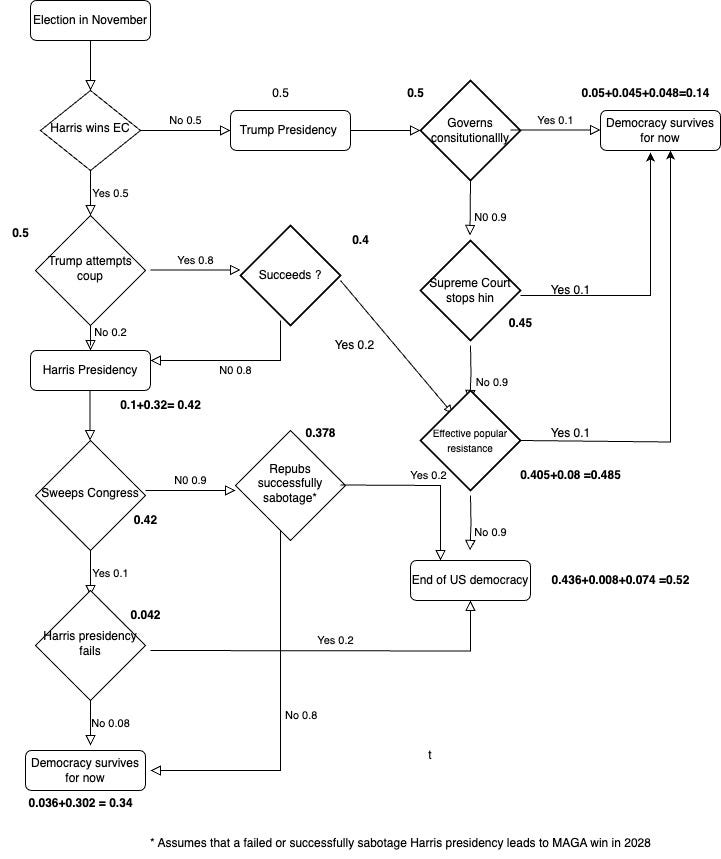What can Americans do? What should Australia do? A few weeks ago, I drew up a flowchart to estimate the probability that Trump would establish a dictatorship in the US, which looked, at the time, like an even money bet. We don’t need to speculate any more. Trump has announced the dictatorship, and there is no sign of effective resistance. The key elements so far include Extremists announced for all major positions, with a demand that they be recess appointments, not subject to Senate scrutiny A state of emergency from Day 1, with the use of the military against domestic opponents Mass deportations, initially of non-citizens and then of “denaturalised” legal immigrants A third term (bizarrely, the nervous laughter that greeted this led to it being reported as a
Topics:
John Quiggin considers the following as important: Uncategorized
This could be interesting, too:
tom writes The Ukraine war and Europe’s deepening march of folly
Stavros Mavroudeas writes CfP of Marxist Macroeconomic Modelling workgroup – 18th WAPE Forum, Istanbul August 6-8, 2025
Lars Pålsson Syll writes The pretence-of-knowledge syndrome
Dean Baker writes Crypto and Donald Trump’s strategic baseball card reserve
What can Americans do? What should Australia do?
A few weeks ago, I drew up a flowchart to estimate the probability that Trump would establish a dictatorship in the US, which looked, at the time, like an even money bet.

We don’t need to speculate any more. Trump has announced the dictatorship, and there is no sign of effective resistance. The key elements so far include
- Extremists announced for all major positions, with a demand that they be recess appointments, not subject to Senate scrutiny
- A state of emergency from Day 1, with the use of the military against domestic opponents
- Mass deportations, initially of non-citizens and then of “denaturalised” legal immigrants
- A third term (bizarrely, the nervous laughter that greeted this led to it being reported as a joke).
- A comprehensive purge of the army, FBI and civil service
It’s clear that Trump will face no resistance from the Republican party. There’s an outside chance that the Supreme Court will constrain some measures, such as outright suppression of opposition media, but that won’t make much difference.
It’s possible that Trump will overreach in some way, such as carrying out his threat to execute political opponents before the ground is fully prepared. Or, his economic policies may prove so disastrous that even rigged elections can’t be won. But there is no good reason to expect this.
I can’t give any hopeful advice to Americans. The idea of defeating Trump at the next election is an illusion. Although elections may be conducted for some time, the outcome will be predetermined. Street protest might be tolerated, as long as it is harmless, but will be suppressed brutally if it threatens the regime. Legal action will go nowhere, given that the Supreme Court has already authorised any criminal action Trump might take as president.
The models to learn from are those of dissidents in places like China and the Soviet Union. They involve cautious cultivation of an alternative, ready for the opportunity when and if it comes.
For Australia, the easy, and wrong, course of action will be to pretend that nothing has happened. But in reality, we are on our own. Trump is often described as “transactional”, but this carries the implication that having made a deal, he sticks to it. In reality, Trump reneges whenever it suits him, and sometimes just on a whim. If it suits Trump to drag us into a war with China, he will do it. Equally, if he can benefit from leaving us in the lurch, he will do that
Our correct course is to disengage slowly and focus on protecting ourselves. That means a return to the policy of balancing China and the US, now with the recognition that there is nothing to choose between the two in terms of democracy. We need to back out of AUKUS and focus on defending ourselves, with what Sam Roggeveen has called an “echidna” strategy – lots of anti-ship missiles, and the best air defences we can buy, from anyone willing to supply them.
I’ll be happy to be proved wrong on all this.
